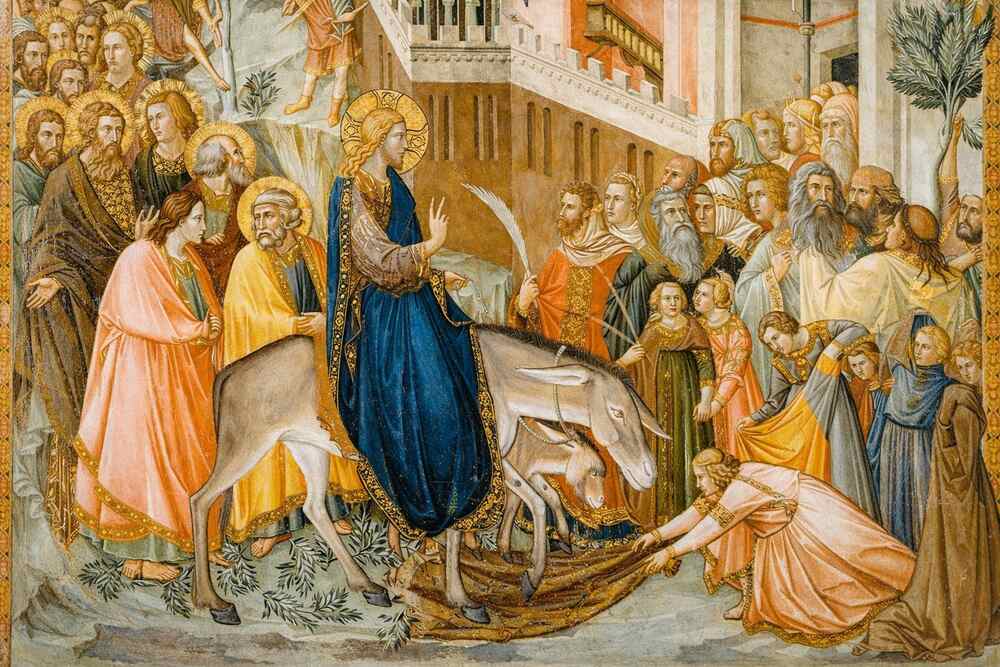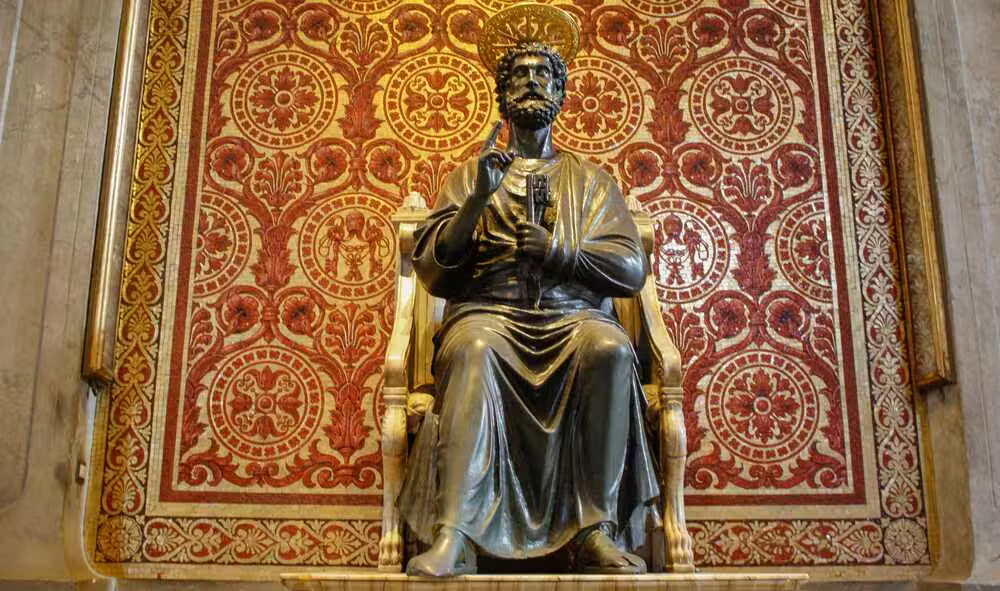Holy Communion is indispensable for our sanctification. In it, we receive the Holy of Holies—Christ Himself. It is He who shapes our hearts, pours out His grace, reveals His will, and helps us grow in the virtues needed for our state of life.
Such is the greatness of Jesus’ love that He not only desires to dwell in our hearts, but also to become one with us, making us partakers of His Divine Life. For this reason, the Sacramental Communion transforms the soul and makes the path to holiness possible—which is nothing less than the perfect love of God.
This is why St. Peter Julian Eymard advised:
In the ineffable union that the communicant contracts with the Lord, love for Jesus Christ reaches the ultimate degree of perfection and produces copious graces. Therefore, we must aspire to Communion, and to frequent and even daily Communion, for as much good, holy, and perfect as piety, virtues, and love can suggest to us.
In this article, following the saint’s counsel, we will reflect on the importance of the Eucharist as the perfect means to sanctification. We will consider the seven marvelous fruits of Holy Communion in our souls, as well as the dispositions necessary for it to truly transform our lives.
You can use the Catholic Mass Times app to find the nearest Catholic church with Mass, Confession, and Adoration schedules. It will surely be useful! Download it now.
Dispositions to Receive Holy Communion
When we receive Sacramental Communion, several effects take place in our soul as a result of our intimate union with Christ. The fruitfulness of these graces depends on the interior dispositions of the communicant. For this reason, they can be hindered if we deliberately place obstacles to the sacrament.
First of all, it is essential to be in the state of grace. To receive Communion in mortal sin is to commit an even greater sin—the sin of sacrilege. As St. Paul warned:
For anyone who eats and drinks without discerning the body eats and drinks judgment on himself. (1 Cor 11:29)
On the other hand, if we approach Communion with a soul free from mortal sin, grace increases within us. All this is possible because we are receiving Christ Himself, the very author of grace.
Venial sins are not an obstacle to receiving the Eucharist. Nevertheless, it is fitting to acknowledge them, repent sincerely, and make a firm resolution to fight against our vices and inclinations. If it is Christ whom we are about to receive, should we not be as clean as possible, preparing our heart as a worthy dwelling for Him? Who among us would welcome a dear friend or relative into a house left in disorder? Why, then, would we not do the same for the Lord who desires to make His home in our souls? As Jesus said:
Whoever loves me will keep my word, and my Father will love him, and we will come to him and make our dwelling with him. (Jn 14:23)
Moreover, grace can only bear fruit if we are fully conscious of whom we are receiving. Many approach the altar without truly believing that Jesus Christ is really present in the Blessed Sacrament. How, then, can the Lord work in their souls if there is no faith? It is essential that we form ourselves, pray over this mystery, and realize that it is truly Christ Himself whom we receive. Let us ask for a steadfast faith.
As we grow in the knowledge of the mercy the Lord has shown us in the Eucharist, we will also grow in awe of His works and in love. And we will desire to receive Him more often and more fervently, so that we may give Him our love in return. This was the experience of Blessed Andrea Beltrami:
“Wherever I may be, I will constantly think of Jesus in the Blessed Sacrament. I will direct my thoughts to the Sacred Tabernacle, even at night, when I awake from sleep, adoring Him from wherever I am, calling upon Jesus in the Blessed Sacrament, offering Him whatever I am doing at that moment. I will install a telegraph line from my study to the church, another from my bedroom, and a third from the refectory; and as often as I can, I will send messages of love to Jesus in the Blessed Sacrament.”
Thirdly, we must receive Communion with the right intention. This means receiving it because we long to be united with Christ—out of love for Him, and to glorify and please God the Father.
We must be careful to avoid Communions made out of routine, vanity, or mere obligation. Many souls who grow accustomed to receiving Jesus in this way end up losing faith in the Eucharist and cease to receive it altogether. If we notice our heart growing cold, let us make an act of love and renew our intention. Let us not stop receiving Communion; rather, let us correct the disposition of our heart. Jesus ardently desires to come to us. He revealed this to St. Margaret Mary Alacoque:
“I so ardently desire to be received by souls, that I hasten to them each time they call upon me with their longing.”
Finally, it is of great help to prepare our souls by receiving Communion with devotion. This means that our interior disposition should be reflected outwardly. Let us not only receive with reverence of body, but also with hearts surrendered to the will of God and ready to give ourselves entirely to Him, so that He may work within us. Let us give Him the space for grace to bear fruit.
- You may be interested in: 4 Proofs of the Real Presence of Christ in the Eucharist
The Fruits of Holy Communion
1. Increases union with Christ
The principal fruit of receiving the Eucharist is our intimate union with Jesus. As the Lord Himself says:
Whoever eats my flesh and drinks my blood remains in me and I in him (Jn 6:56).
Life in Christ has its foundation in the Eucharistic banquet:
Just as the living Father sent me and I live because of the Father, so the one who feeds on me will live because of me (Jn 6:57).
Each Sacramental Communion is like a new and ongoing Incarnation of Jesus Christ within us. It establishes a union of life and love between the soul and the Savior. As this union deepens, we become more and more conformed to Him. Through Communion, the Christian is transformed into another Christ. St. Peter Julian Eymard explains it this way:
“Man will work, and Jesus will give the grace of the work. Man will keep for himself the merit, but all the glory will belong to Jesus Christ. Jesus will still be able to say to His Father: ‘I love You, I adore You, I suffer still, and I live anew in the members of my Church (Christians)’.”
2. Increases the life of grace
So says the Catechism:
What material food produces in our bodily life, Holy Communion realizes in our spiritual life. Communion with the Flesh of the risen Christ, “vivified by the Holy Spirit and vivifying” ( PO 5), preserves, increases, and renews the life of grace received in Baptism. This growth of Christian life needs the nourishment of Eucharistic Communion, the bread of our pilgrimage, until the moment of death, when it is given to us as viaticum.
3. Holy Communion separates us from sin
The Body of Christ we receive in Holy Communion is “given up for us,” and the Blood we drink is “poured out for many for the forgiveness of sins.” Thus, the Eucharist cannot unite us to Christ without at the same time cleansing us from sin and preserving us from future sins. It is the remedy that heals the wounds of sin and strengthens us to live faithfully in Christ.
4. Wipes Away Venial Sins
The Eucharist strengthens charity that tends to grow weak in daily life. This renewed wipes away venial sins (cf. Council of Trent: DS 1638). By giving Himself to us, Christ rekindles our love and makes us capable of breaking disordered attachments to creatures so that we may cling more firmly to Him. For this reason, during each Mass we ask forgiveness, and our souls are purified of venial sins, making us more disposed to receive Him worthily.
5. It preserves us from future mortal sins
By enkindling charity within us, the Eucharist also preserves us from falling into future mortal sins.. The more deeple we participate in the life of Christ and progress in his friendship, the more difficult ito sever that bond through mortal sin. Instead, spiritual growth becomes easier. Daily Communion was the secret of the saints to preserve and increase the life of grace and their love for God and neighbor.
6. It strengthens the unity of the Church
Those who receive the Eucharist are united more closely to Christ. By this very fact, He unites them more deeply to all the faithful in one body—the Church. Communion renews, strengthens, and deepens this incorporation into the Church, already accomplished through Baptism. St. Paul reminds us:
Because the loaf of bread is one, we, though many, are one body, for we all partake of the one loaf. (1 Cor 10:17).
Saint Augustine exhorted:
“If you are the body and members of Christ, then it is your sacrament that is placed on the table of the Lord; it is your sacrament that you receive. To that which you are you respond “Amen” (“yes, it is true!”) and by responding to it you assent to it. For you hear the words, “the Body of Christ” and respond “Amen.” Be then a member of the Body of Christ that your Amen may be true“. (Saint Augustine, Sermo 272).
- You may be interested in: What is the Mass and what Miracles occur in it?
7. Moves Us to Charity Toward the Needy
Holy Communion opens our eyes to see Christ in the poor and most vulnerable. As He taught in the Gospel, when we feed the hungry, we feed Him; when we clothe the naked, we clothe Him. Whatever good we do for the least of our brothers and sisters, we do for the Lord Himself. St. John Chrysostom warns:
“You have tasted the Blood of the Lord, yet you do not recognize your brother,…. You dishonor this table when you do not judge worthy of sharing your food someone judged worthy to take part in this meal…. God freed you from all your sins and invited you here, but you have not become more merciful”. (Hom. in 1 Cor 27:4).
Frequent Sacramental Communion
How many marvelous fruits are produced in our souls through a well-prepared Communion! And how many more through frequent Communions received with fervor! Let us give thanks to the Lord for His goodness, and let us strive to receive Him each day as if it were our very last Holy Communion.
Let us make a firm resolution never to abandon the practice of receiving the Blessed Sacrament. Let us follow the counsel of St. Peter Julian Eymard:
“Receive Communion for Jesus Christ, if not for yourself. To receive Communion for Jesus Christ is to console Him for the abandonment He suffers from most men. It is to tell Him that He was not mistaken when He instituted this Sacrament of spiritual nourishment. It is to make fruitful the treasures of grace that Jesus Christ has enclosed in the Eucharist solely to distribute them among men. Even more, it is to give His love the expansion it desires, His goodness the joy of bestowing favors, and His kingship the glory of pouring out His benefits.”
And let us pray with St. Thérèse of the Child Jesus:
You listened to me, the only friend whom I love.
To enchant my heart, you became man.
You shed your blood, oh what a supreme mystery.
And you still live for me on the Altar.
If I cannot see the brilliance of your face
or hear your sweet voice,
Oh my God, I can live by your Grace,
I can rest in your Sacred Heart!
What is Sacramental Communion?
What are the Fruits of Communion?
The fruits of Communion are the spiritual effects produced by receiving the Eucharist in grace with faith and right inner disposition.
What are the Fruits and/or Effects of Communion?
The fruits of Communion are:
- It increases union with Christ,
- It increases the life of grace,
- It separates us from sin,
- It forgives venial sins,
- It preserves us from future mortal sins.
- It strengthens the unity of the Church,
- It increases and inclines us to the practice of charity.
Why is it Important to Commune Frequently?
Frequent Communion multiplies its fruits in the soul: it strengthens union with Christ, increases grace, and fortifies the Christian in his or her path to holiness. That is why many saints advised receiving Communion daily.
What Fruits of Communion Help in Daily Life?
In daily life, Communion strengthens faith, renews love for God and neighbor, inspires works of charity, and helps to overcome temptations. Thus, the Eucharist transforms not only the soul, but also our daily actions.











